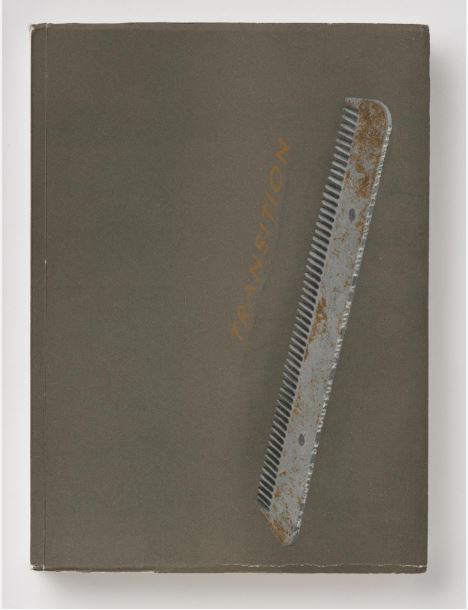Marcel Duchamp
(Blainville, France, 1887 - 1968, Neuilly-sur-Seine, France)
Transition (No. 26)
Printed book with photomechanical reproductions
9 x 6 1/4 in. (22.9 x 16.0 cm)
Collection of the Akron Art Museum
Gift of John Coplans
2021.34
More Information
Transition was an experimental literary journal that featured surrealist, expressionist, and Dada art and artists. Founded in 1927 by Paris-based poet Eugene Jolas and his wife Maria McDonald, it was originally intended to serve as an outlet for experimental poetry, but gradually expanded to incorporate contributions from sculptors, photographers, writers, civil rights activists, critics, and cartoonists. The magazine ran through the spring of 1938, with a total of 27 issues published. Jolas envisioned Transition as a place of refuge in which experimental writers might express themselves without fear of criticism, and as a vehicle for critique of the rigidity of American views on art and politics. This twenty sixth issue of the journal features writing by James Joyce (“Work in Progress”, a serialized portion of the work, later to become Finnegan’s Wake), Franz Kafka (part of editor Eugene Jolas’s translation of Metamorphosis), James Agee (“In Memory of My Father”), Hans Arp (“The Skeleton of the Day”), Randall Jarrell (“Two Poems”), and Muriel Rukeyser (“Lover as Fox”), as well as music by Aaron Copland ( “Gyp’s Song”), photographs by Man Ray and Edward Weston, and illustrations of artwork by Wassily Kandinsky, Fernand Leger, Joan Miro, and Laszlo Maholy-Nagy. Most prominently, the cover is graced with a highly detailed and realistically convincing image of a rusted metal hair comb, provided by Marcel Duchamp as a printed adaptation of his famed readymades. --Jeff Katzin, PhD., Assistant Curator
Keywords
BookCubism
Dada
Conceptual
Readymade
Journal
Surrealism
Expressionism
French
Paris
Civil Rights
Criticism
Publication
Reproduction

